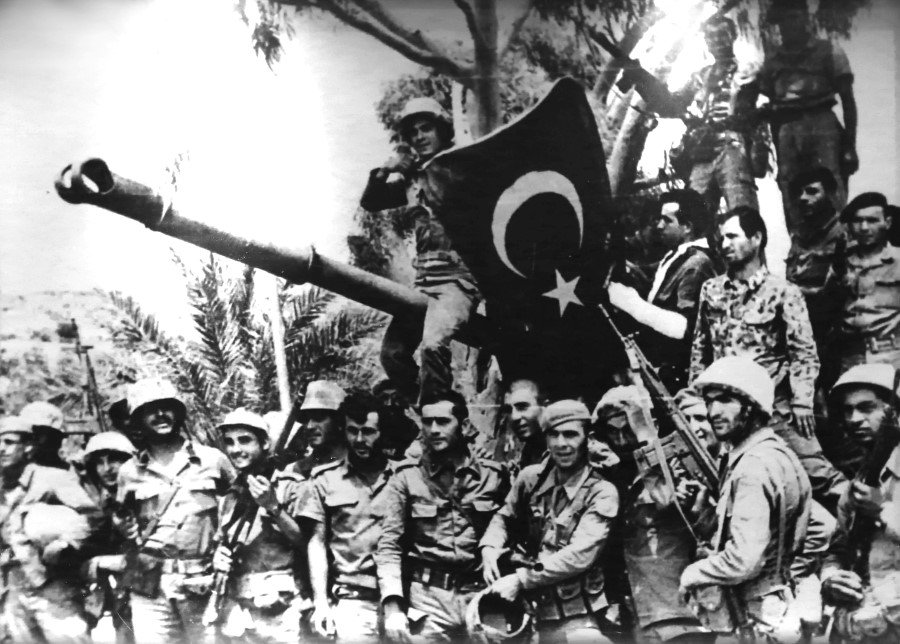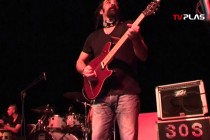On 14 August, 1974, Turkey commenced the second phase of its military intervention in Cyprus. The order was famously given in a coded message referring to the daughter of the then Foreign Affairs Minister Turan Güneş.
“Tell Mr Güneş that Ayşe can go on holiday,” was the secret signal given by the late Turkish Prime Minister Bülent Ecevit.
The military action went ahead, controversially at the time, while a second round of peace talks involving Turkey, Greece and the United Kingdom – the island’s “guarantor” powers – was dragging on in Geneva, Switzerland.
The Greek and Greek Cypriot side had asked for an extra 36 hours to consider proposals regarding a separate zone for the island’s Turkish Cypriot population.
Talks had initially begun following the first phase of Turkey’s military intervention, which was launched on 20 July, 1974.
It came five days after a Greek junta-engineered coup saw EOKA terrorist Nicos Sampson installed as the island’s leader. Scores of Greek Cypriots were killed by fellow Greek Cypriots during the violence.
Sampson would later say in an interview with a Greek newspaper, printed in 1981, that had Turkey not intervened “I would not only have proclaimed ENOSIS (union between Cyprus and Greece), I would have annihilated the Turks in Cyprus”.
President Archbishop Makarios, having fled the island, appealed to the international community for help, branding the events as an invasion of the island by Greece.
Turkey, fearing a declaration of ENOSIS and grave concerns over the fate of the Turkish Cypriots who, for 11 years had been living under siege following an attempt to wipe out the community in the 1960s, invoked its rights to intervene under the Treaty of Guarantee.
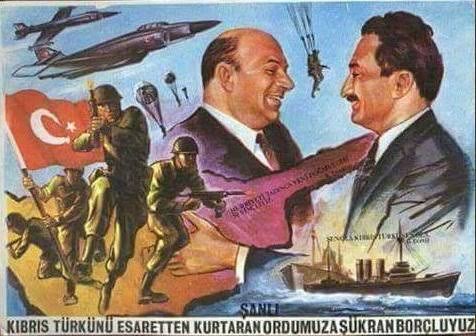
“We are actually going to the island for peace, not for war, and not just for the Turkish Cypriots but for the Greek Cypriots as well,” Mr Ecevit told reporters at the time.
A ceasefire was agreed at 4pm on 22 July, 1974, leaving the Turkish Army in control of a stretch of land including the main road between Girne (Kyrenia) and Lefkoşa (Nicosia).
But at that point the safety of the Turkish Cypriot population, living in enclaves scattered across the island, was far from secured.
Thousands of Turkish Cypriot men of fighting age were rounded up and held in prison camps at schools and stadiums, leaving unarmed women, children and the elderly at the mercy of EOKA-B gunmen. Others sought refuge at Episkopi in the British Sovereign Base Areas, where they lived in tents for several months before they were transferred to North Cyprus.
Around 13,000 Turkish Cypriots were besieged within the old walls of Gazimağusa (Famagusta), until they were liberated by the Turkish Army on 16 August, 1974.
Meanwhile the first round of Geneva talks, which concluded on 30 July, resulted in a declaration calling on “all Turkish enclaves occupied by Greek or Greek Cypriot forces” to be “immediately evacuated” and that they would “continue to be protected by UNFICYP” (United Nations Peacekeeping Forces in Cyprus).
Other Turkish Cypriot enclaves outside the area controlled by the Turkish armed forces would “continue to be protected by an UNFICYP security zone”.
Turkish troops ended the siege of Gazimağusa/Famagusta on 16 Aug. 1974, where 13,000 Turkish Cypriots had been trapped
However attacks on the Turkish Cypriot population continued and the precarious situation of its own troops prompted Turkey to launch the second phase of its operation, eventually extending the safe haven for Turkish Cypriots to today’s boundaries.
Despite the clear justification for the move, international opinion, which had initially been with Turkey, swung in the opposite direction.
It had been felt that with Sampson having being removed – and Glafcos Clerides installed as acting President – and the fall of the military junta in Greece, the second phase of Turkey’s operation was unnecessary.
Responding to such views, Mr Ecevit explained the reasons for both phases of the Peace Operation in a BBC Panorama interview recorded in August 1974.
“The [15 July] coup initiated by the military regime in Athens which brought Mr Sampson to power had heralded a new era of terrorism, massacres and anarchy or chaos on the island and we were sure that that would be the end of the independent State of Cyprus and de facto ENOSIS, even if the name were not to be uttered, and new massacres against the Turkish people,” he said.
“So we felt that if we didn’t act in time everything would have been lost, not only the freedom and safety of the Turks, but the whole state of Cyprus, so we had to do something about it immediately.
“But we didn’t want to resort to military action. That’s the reason why I went to Britain immediately after the coup … on the 17th [of July] and talked with [Prime Minister Harold] Wilson, [Foreign Secretary James] Callaghan and their colleagues and enquired if we could do something together as guarantor powers.
“Unfortunately I couldn’t receive a positive reply and we didn’t have any time to lose, so we acted.”
Put to him by Panorama interviewer Richard Kershaw that Turkey had “lost a lot of world sympathy” by issuing an “ultimatum” during the Geneva conference and refusing to accept the Greek side’s request for an extra 36 hours, Mr Ecevit replied: “We had several reasons and justifications [for turning down the request].
The BBC’s Panorama on Turkey’s intervention in Cyprus in 1974, ft Turkish PM Bülent Ecevit
“One is that even in the beginning of this second round of Geneva talks we had told the British, Greece and the [Greek Cypriots] about our suggestion.
“It wasn’t something new that they learned on the sixth day of the conference and it was obvious that our proposal would not be acceptable to the Greeks.
“We were also sure that they were trying to gain time because after the change of regime in Athens, which we really welcomed in Turkey, the Greek government had become aware that they were quickly gaining prestige in the international world and they thought that if they had time they could give things the direction they wished in the diplomatic field.
“Another factor: there was a very serious case of security for the Turkish units. They were large units squeezed into a very small part of the island and they were exposed to all sorts of dangers … squeezed, almost imprisoned, into a small area.
“They weren’t being effective to secure the safety of the Turks elsewhere and they could not even undertake their own security because they were exposed to all sorts of dangers within a small area, surrounded by Greek forces.”
When challenged by Kershaw that it was “difficult to believe” that the 36 hours the Greeks had asked for would have “totally changed the military scene”, Mr Ecevit responded that it had been a “matter of taking risks”.
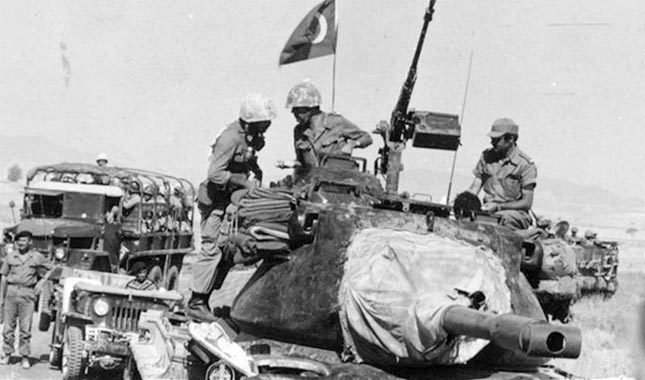
“We felt that we had taken all the risks we could regarding the security of the Turkish troops on the island by waiting so many days after the first Geneva talks and there were several indications that the Greeks were after gaining time, after delaying tactics,” he said.
Most Greek Cypriots at the time – and still today – refused to accept the role they had played in bringing about the division of Cyprus.
They instead blamed the United States for “failing” to prevent Turkey from sending its troops in, as the US had done in June 1964 with the infamous “Johnson letter” from President Lyndon B Johnson to Turkey’s then Prime Minister İsmet İnönü.
An angry mob of protesters attacked the US embassy in Nicosia, where Ambassador Rodger Davies and a member of staff called Antoinette Varnavas were shot dead by a sniper on 19 August, 1974.
Elsewhere, the gruesome reality of the dangers still faced by the Turkish Cypriots in August 1974 was brought to light with the discovery of the mass graves of civilians, including young children, from villages such as Muratağa, Atlılar, Sandallar and Taşkent.
A historical overview of the Cyprus issues published on the Turkish Ministry of Affairs website states: “In July 1974, after the first phase of the Turkish intervention, an international conference was held at Geneva between Turkey, Greece and Britain.
“It was agreed that Greek and Greek Cypriot forces would leave all the Turkish Cypriot enclaves, but showing their customary disregard for international agreements they proceeded instead to murder almost the entire civilian population of six Turkish Cypriot enclaves in both the north and south of the island, and despite the presence in Cyprus of UN troops.”
The article said that at the beginning of the second Geneva conference Mr Ecevit had said: “A solution which is not based on geographical separation will not work. It is out of the question for us to entrust the safety of the Turkish Cypriots to the Greeks, who cannot even rule themselves. The areas around the Turkish forces are being mined, and the Turkish Cypriot villages are still under siege.”
Barrister Michael Stephen provides the British Parliament with a list of international media coverage that documented the atrocities committed against Turkish Cypriots following the initial July 1974 ceasefire
In written evidence submitted to the House of Commons Foreign Affairs Select Committee as part of a 2004 inquiry into British government policy on Cyprus, barrister Michael Stephen, quoting reports from international media, listed the atrocities that had been committed against Turkish Cypriots following the initial July 1974 ceasefire.
“In the village of Tokhni [Taşkent] on 14 August 1974 all the Turkish Cypriot men between the ages of 13 and 74, except for eighteen who managed to escape, were taken away and shot. (Times, Guardian, 21 August)
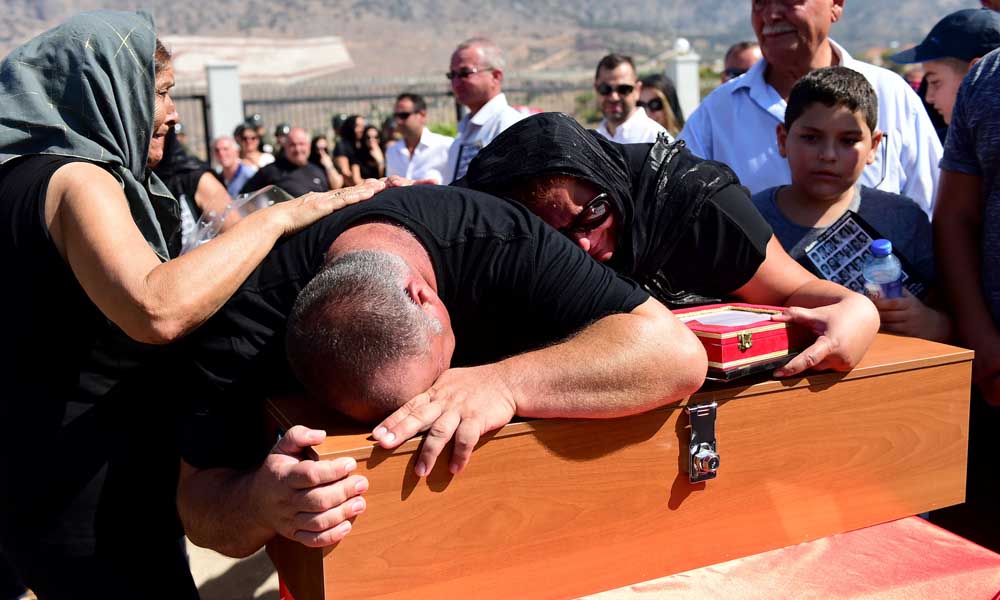
“In Zyyi on the same day all the Turkish Cypriot men aged between 19 and 38 were taken away and were never seen again.
“On the same day Greek Cypriots opened fire in the Turkish Cypriot neighbourhood of Paphos killing men, women, and children indiscriminately.
“On 23 July 1974 the Washington Post reported: ‘In a Greek raid on a small Turkish village near Limassol 36 people out of a population of 200 were killed. The Greeks said that they had been given orders to kill the inhabitants of the Turkish villages before the Turkish forces arrived. The Greeks began to shell the Turkish quarter on Saturday, refugees said. Kazan Derviş, a Turkish Cypriot girl aged 15, said she had been staying with her uncle. The [Greek Cypriot] National Guard came into the Turkish sector and shooting began. She saw her uncle and other relatives taken away as prisoners, and later heard her uncle had been shot.’
“On 28 July the New York Times reported that 14 Turkish Cypriot men had been shot in Alaminos.
“On 24 July, 1974, France Soir reported: ‘The Greeks burned Turkish mosques and set fire to Turkish homes in the villages around Famagusta. Defenceless Turkish villagers who have no weapons live in an atmosphere of terror and they evacuate their homes and go and live in tents in the forests. The Greeks’ actions are a shame to humanity’.
The New York Times was one of many media outlets to publish details of the mass killings of Turkish Cypriots in 1974
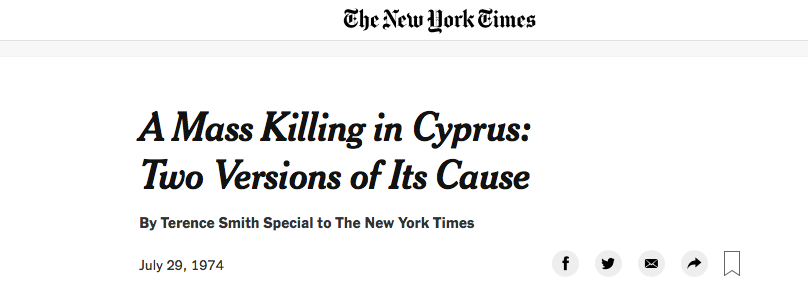
“On 22 July Turkish Prime Minister Ecevit called upon the UN to ‘stop the genocide of Turkish Cypriots’ and declared ‘Turkey has accepted a ceasefire, but will not allow Turkish Cypriots to be massacred’.
“The German newspaper Die Zeit wrote on 30 August, 1974: ‘The massacre of Turkish Cypriots in Paphos and Famagusta is the proof of how justified the Turks were to undertake their intervention’.”
Mr Stephen also quoted an article from the Daily Telegraph that said the Turkish Cypriots had “constitutional right on their side and understandably fear a renewal of persecution if the Turkish army withdraws”.
Mr Stephen, addressing criticism of the second stage of Turkey’s military intervention, had this to say: “Some people argue that having defeated the Sampson coup, and Makarios having returned to the Presidential Palace, Turkey should have withdrawn and left the Turkish Cypriots again at the mercy of Makarios, the man who had been responsible for the earlier massacres.
“That proposition has only to be stated for its absurdity to be appreciated. It must be remembered that UN troops had been in Cyprus since March 1964 and had failed to protect the Turkish Cypriots. The Turkish Cypriots were later to see what happened to the Muslim people of Srebrenica under international protection.
“Turkey could discharge its treaty obligation only by providing a safe haven for the Turkish Cypriots in which they could live in peace and freedom, and by encouraging them to reach a new political arrangement with the Greek Cypriots in which they could play their part as political equals in the government of the island.”
He continued: “The United Nations, the Commonwealth, and the rest of the world have put political expediency before principle, and failed to condemn the appalling behaviour of the Greek Cypriots. Greek Cypriots are guilty of attempted genocide in violation of Articles 2(a), (b) and (c) and Articles 3(a), (b), (c), (d) and (e) of the 1948 Genocide Convention, but no action has ever been taken against them.
“Instead they have been rewarded by being treated as the Government of all Cyprus. The Turkish Cypriots by contrast were frozen out of the UN, the Commonwealth and almost every other international organisation, and were not even allowed to be heard when important decisions affecting their future were made.
“This act of betrayal by the United Nations itself has enabled the Greek Cypriots for more than forty years to treat the Turkish Cypriots as a mere community, to take most of the international aid for themselves, to embargo Turkish Cypriot trade and communications with the outside world, to occupy the Cyprus chair in all international institutions, and to convince the world that they, and not the Turkish Cypriots, are the injured party.”
Labour’s Lord Willis, speaking in the House of Lords 17 December, 1986 said: “Turkey intervened to protect the lives and property of the Turkish Cypriots, and to its credit it has done just that.
“In the 12 years since, there have been no killings and no massacres.”
Former Greek Cypriot Foreign Minister Erato Kozakou-Marcoullis has publicly acknowledged the atrocities committed against Turkish Cypriots in 1974
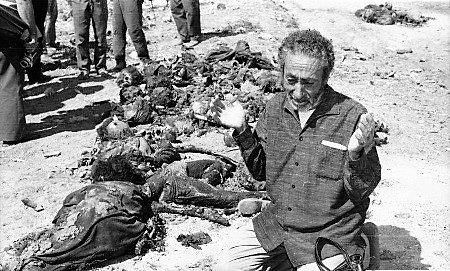
Former Greek Cypriot Foreign Minister Erato Kozakou-Marcoullis was one of the few Greek Cypriots to acknowledge publicly the atrocities committed against Turkish Cypriots in 1974.
Writing in 2016, she said: “I feel the need to express a sincere public apology to our Turkish Cypriot compatriots for the horrific crimes committed on 14 August 1974 by EOKA B extremists against 126 women and children in the villages of Muratağa, Atlılar and Sandallar, and 85 civilian men (including a boy of 12 years old) from the village of Tochni.
“Unfortunately, during the past 42 years no investigation has been conducted by my state to unravel the truth behind these crimes and none of the culprits has been brought to justice.
“It is time to finally establish a Truth Commission to effectively ascertain the truth behind the recent Cyprus tragedy, because without the truth there will be no reconciliation and without reconciliation there will be no peaceful co-existence.”
“We cannot turn a blind eye to the crimes committed by our own extremists against civilians and innocent Turkish Cypriots.”


